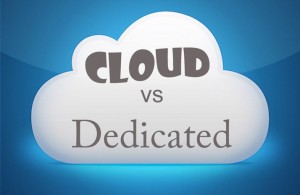
Cloud computing is all the rage today, providing redundancy, scalability and on-demand services, yet questions abound exactly what the cloud actually is as advertised by many web hosting providers. Alas, cloud computing cannot be leveraged to fit every business application, thus this explanation of the basic differences between dedicated servers and cloud services.
Disk IO
A properly configured dedicated server offers great performance on a per-dollar basis, especially when it comes to disk IO. As configured and sold by many web hosting providers, cloud services share network and underlying storage between customers, sometimes resulting in unpredictable disk IO. For example, slowdowns may occur if one specific client begins to send large quantities of write requests to their storage array. Bottlenecks can also happen upstream. Plus, not all disk IO issues can be remedied within the framework of the cloud.
Speed
What about speed? Cloud is great for increasing storage capabilities, but not necessarily faster storage. A huge selling point with cloud is its ability to easily scale CPU and RAM. Scaling disk IO within the cloud varies by provider and while Amazon offers that service, depending on your operations, a dedicated server with RAID 10 usually outperforms more expensive and complex cloud services.
Cloud Computing
Why the confusion about what cloud really is? Quite often, due to its inherent design or configuration choices, cloud services can obscure network and hardware problems, making it difficult to look inside of your app to locate the bottleneck. Essentially, cloud is a shared service whereby disk, CPU, RAM and network resources is shared with others.
Isolating Issues
Boundaries are set up to isolate your neighbors, but temporary outages and performance issues can arise that have nothing to do with your application whatsoever. The result? These are difficult to recognize or catch, leaving you and your provider to chase ghosts in performance. If hardware is the issue, sometimes migrating the instance to another physical node is what is needed to isolate the problem. With cloud, these migrations are easy enough, but with dedicated servers, the hardware can be ruled out fairly easily.
Redundancy
Let’s talk about redundancy differences between the two services. While some feel cloud services are inherently more redundant, a node in a cloud service is not usually any more reliable than a single dedicated server. Node failures cause workloads to die, much in the same way that a dedicated server would fail if its RAM, power supply or CPU bit the dust. If you’re considering cloud services, ask about built in redundancies.
Complexity
Part of the mystic of cloud services is their complexity. If you’re running a simple hosting operation, dedicated is the better choice. Why? Complexity adds costs, both in terms of support and in hardware. If you’re a small business offering web design and development, and using Joomla, Drupal, WordPress or other CMS in conjunction with cPanel or Plesk, dedicated servers will normally give you more bang for your dollar, plus they’re highly reliable.
Migration Path
Something a lot of prospects don’t even consider is their migration path should their requirements change. Will they be locked in to their existing cloud solution? Some portion of their cloud service may remain the same between providers, but stuff like database abstraction layers and object based storage often have very different APIs. On the other hand, if you’re using a dedicated server with a cPanel or Plesk hosting control panel, migration to another provider is fairly simple.
 Scalability
Scalability
If you absolutely need scalability, cloud does make that easier. The problem with cloud is simply that you can’t just insert your operations into your provider’s network and expect it to function seamlessly because attempting to cram legacy apps into a scalable, cloud framework sometimes results in disaster.
Price point
Properly managed dedicated servers are still an excellent choice for high performance operations and reliability at a better price point, compared to some of the cloud services offered today.
BROUGHT TO YOU BY PROLIMEHOST
We’ve been in the web hosting industry for over a decade, helping hundreds of clients succeed in what they do best and that’s running their business. We specialize in Virtual Private Servers (VPS) and dedicated servers, with data centers in Los Angeles, Denver & Singapore.
VPS SERVICES: LIGHTNING FAST SSD VIRTUAL SERVERS
Our Virtual Private Servers all feature high performance Xeon processors and SSD storage in a RAID10 configuration to optimize your server’s performance, which dramatically enhances visitor experiences on your site.
That speed is backed by unparalleled 24/7 support, featuring both outstanding response AND resolution times to maximize your uptime.
Now is the time to join the ProlimeHost virtual private server revolution.
DEDICATED SERVERS: BACKED BY A 99.9% SLA NETWORK UPTIME GUARANTEE
We only use enterprise-class hardware in our dedicated servers and offer a four (4) hour hardware replacement. Throw in IPMI for remote management, support for public and private networks, free operating system (OS) re-installs, and SATA, SAS & SSD (including NVMe) storage. For everything from gaming, AMD and GPU servers to cheap dedicated servers, we’re here to help.
ASIA OPTIMIZED SERVERS: IMPROVING CONNECTION SPEED AND QUALITY
Procuring an Asia optimized server improves the connection speed and quality between the server and the users in Asia or China. This can reduce latency, packet loss, jitter, and bandwidth issues that can affect the performance and reliability of the server and the applications hosted on it. For more information, please call 1-877-477-9454 or contact us





